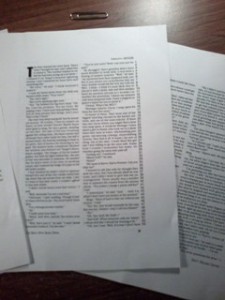I have my beliefs, and I don’t want to rain on any one’s parade, so I generally don’t try to pick fights with the religious crowd. Mostly, I envy them. That belief in an after-life is like a nice warm blanket you can pull over yourself when the cold realization of your own mortality overcomes you. That feeling suddenly overcame me today when I was out on a walk. I got to thinking about our home remodel, and how this is the house we plan to raise our family in for at least the next fifteen years (until Calvin graduates from high school), and I realized that if all goes as we expect, I’ll go from 35 to 50 in this house. Essentially, passing from being a young man through middle age. My children will grow up. Many others will die; still others will be born. For what? And why? There is no why. There just is. Why is the moon the moon?
You can either invent a fiction to believe in, or you can try to put it out of your mind as best you can. Otherwise you’ll be overcome with grief — not sadness, but grief. You’ll grieve for your own eventual death and for the eventual death of everyone around you. It’s not a way to live. And topping it off is the cruel possibility that your life could be winked out unexpectedly at any moment.
The one good thing is that it does make you appreciate everyone around you. You feel more sympathy. You realize that everyone is on the same road, even if they are on different journeys. We are alone, and yet we are together. It is the great irony of humankind.
So I sit and watch my children playing before me. Children are born and live with the cherished myth of an everlasting life. Then one day they, too, feel the death-pangs of grief for the first time, and that will be beginning of the end of their childhoods. It is sad and poignant and you wish you could spare them from it, but you can’t. No one can. You shelter them for a little while, maybe, and that’s part of parenting, but in the end they have to become just as fully human as you.
So what do I do? I go on living. I go on parenting and being a good husband. I love. I try not to do harm. I write, because it’s something I’m somewhat good at, and because I want to become my best self. Occasionally, I write about things like this, because I don’t want to shy away from the shadows or the light. It’s all I can do.
And in the end, you decide to appreciate the gifts the universe has given you. You didn’t have to be born, after all. Ever think about that?


